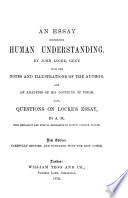 | Henry Calderwood - Ethics - 1872 - 356 pages
...tracing all knowledge to sensation and reflection, admitted the existence of mind, defining Person as ' a thinking intelligent being, that has reason and reflection, and can consider itself as itself.' — Essay (1690) n. 27, sec. 9. While holding that ' there is nothing in the Intellect which was not... | |
 | Henry Calderwood - Ethics - 1874 - 328 pages
...tracing all knowledge to sensation and reflection, admitted the existence of mind, denning Person as ' a thinking intelligent being, that has reason and reflection, and can consider itself as itself.' — Essay (1690; n. 27, sec. 9. While holding that ' there is nothing in the Intellect which was not... | |
 | Charles Porterfield Krauth - Philosophy - 1878 - 1082 pages
...find wherein personal identity consists we must consider what person stands for ; which, I think, is a thinking intelligent being, that has reason and reflection, and can consider itself as itself, the same thinking thing in different times and places." This looks like confining personal identity... | |
 | Henry Calderwood - Ethics - 1878 - 338 pages
...tracing all knowledge to sensation and reflection, admitted the existence of mind, defining Person as ' a thinking intelligent being, that has reason and reflection, and can consider itself as itself.'—Essay (1690) n. 27, sec. 9. While holding that ' there is nothing in the Intellect which... | |
 | John Locke - 1879 - 722 pages
...wherein personal identity consists, we must consider what " person" stands for; which, I think, is a thinking intelligent being, that has reason and reflection, and can consider itself as itself, the same thinking thing, in different times and places ; which it does only by that consciousness which... | |
 | Aaron Walker - Religion and science - 1880 - 506 pages
...ground. — Coleridge. Paley says : The seat of intellect is a person. Lock says : Person stands for a thinking, intelligent being, that has reason and reflection, and can consider itself as itself, * * * which it does only by that consciousness which is inseparable from thinking, and as it seems... | |
 | Charles Porterfield Krauth - Philosophy - 1881 - 1080 pages
...Search after TrutJi, book ii., part Si., chap. 4. PEES0N— : * Person," says Locke, 1 "stands for a thinking intelligent being, that has reason and reflection, and can consider itself as itself, the same thinking thing in different times and places; which it does only by that consciousness which... | |
 | Bible Christians - 1882 - 606 pages
...— " A being capable of exercising understanding and will — a self-determining intelligence ; " "a thinking, intelligent being that has reason and reflection, and can consider itself as itself, the same thinking thing in different times and places ; " "a being intelligent and free, every spiritual... | |
 | Edward Porter Humphrey - Bible - 1888 - 564 pages
...the door. Fourthly, man, like God, is a person, a separate force. " Person," says Locke, " stands for a thinking, intelligent being; that has reason and reflection, and can consider itself as itself,, the same thinking thing, in different times and places." ' A person can say / and my and mine ; may... | |
 | Universalism - 1889 - 540 pages
...discredit the doctrine that God is an Infinite Person. Locke has given a good definition of person : — " a thinking, intelligent being that has reason and reflection, and can consider itself as itself, the same thinking thing in different times and places." This describes human personality, but it holds... | |
| |